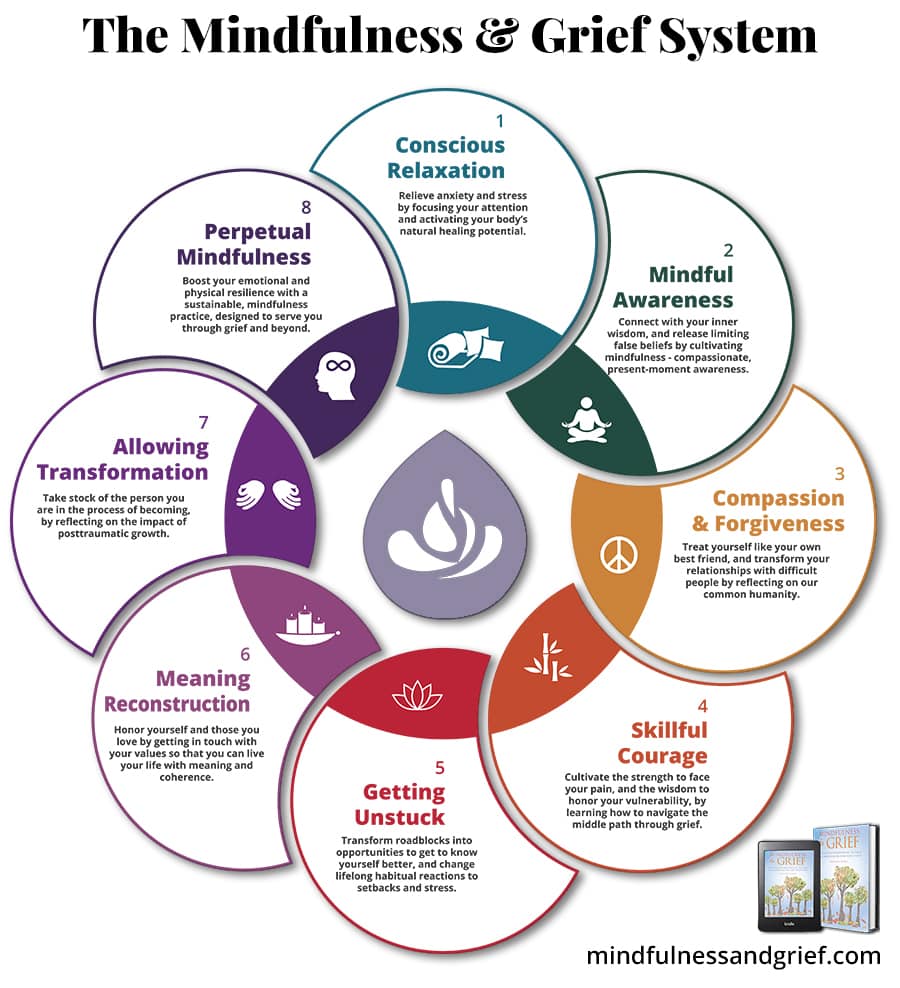
Navigating Grief: Tips for Coping with Loss and Moving Forward
Written: Editor | June 5, 2023

Understanding Grief
Understanding the Grieving Process
Grief is a natural response to loss, and it can manifest in various ways. It is important to understand the grieving process to navigate through it effectively. The grieving process typically consists of several stages, including denial, anger, bargaining, depression, and acceptance. It is important to note that these stages may not occur in a linear fashion and can vary in duration for each individual. It is normal to experience a rollercoaster of emotions throughout the grieving process.
Common Emotions Experienced during Grief
During the grieving process, individuals may experience a wide range of emotions. Some common emotions include sadness, anger, guilt, confusion, and even relief. It is crucial to acknowledge and embrace these emotions rather than suppress them. Each person's experience of grief is unique, and it is essential to give oneself permission to feel these emotions without judgment.
Coping Mechanisms for Dealing with Grief
While grief is a deeply personal experience, there are some coping mechanisms that can help in dealing with the pain and emotions associated with it.
-
Seek Support: Reach out to friends, family, or support groups who can provide comfort and understanding during this difficult time. Sharing your feelings and memories can be healing.
-
Take Care of Yourself: Grief can take a toll on physical and mental health. It is important to prioritize self-care by eating well, exercising, getting enough rest, and seeking outlets for relaxation and stress relief.
-
Express Yourself Creatively: Engaging in creative activities such as writing, painting, or playing music can provide an outlet for expressing and processing emotions.
-
Practice Mindfulness and Self-Reflection: Taking time for self-reflection and practicing mindfulness can help in understanding and accepting the emotions that arise during the grieving process.
-
Seek Professional Help: If grief becomes overwhelming or prolonged, seeking the assistance of a licensed therapist or counselor can provide guidance and support in navigating through the grieving process.
Grief is a deeply personal and challenging experience, but with time and support, healing is possible. Remember to be patient with yourself and allow the grieving process to unfold naturally.

Self-Care during Grief
Grief is a natural response to loss, and it can be an overwhelming and challenging journey. Taking care of oneself during this period is crucial for navigating through the grieving process effectively. Here are some tips for practicing self-care while grieving.
Importance of Self-Care while Grieving
Grief can take a toll on a person's physical, emotional, and mental well-being. Engaging in self-care activities helps individuals cope with their grief and regain some sense of control and stability in their lives. It is essential to prioritize self-care to maintain overall health and well-being during this difficult time.
Healthy Ways to Process and Express Emotions
-
Allow yourself to grieve: Give yourself permission to experience a wide range of emotions, including sadness, anger, and frustration. Acknowledging and expressing these feelings can help in the healing process.
-
Seek support: Reach out to loved ones, friends, or support groups who can provide a listening ear and understanding during your grief journey. Sharing your thoughts and emotions with others can help alleviate some of the burden.
-
Engage in physical activity: Regular exercise, such as walking, yoga, or swimming, can help reduce stress, improve mood, and increase overall well-being. Physical activity releases endorphins, which are natural mood enhancers.
Creating a Supportive Self-Care Routine
-
Practice self-compassion: Be kind and gentle with yourself. Treat yourself with the same care and understanding you would offer to a close friend going through a difficult time.
-
Establish healthy sleep habits: Aim for a consistent sleep schedule and create a calming bedtime routine. Adequate sleep is vital for emotional and physical healing.
-
Engage in calming activities: Find activities that bring you comfort and peace, such as reading, journaling, listening to music, or practicing mindfulness and meditation.
-
Nourish your body: Maintain a balanced diet and ensure you are nourishing your body with healthy and nutritious foods. Avoid turning to unhealthy coping mechanisms like excessive alcohol or junk food consumption.
Taking care of yourself during the grieving process is not selfish but necessary. By practicing self-care, you will be better equipped to navigate through the emotions and challenges that grief presents, and eventually find healing and hope.

Seeking Support and Connection
The Importance of a Support System during Grief
When faced with the overwhelming experience of grief, seeking support and connection is crucial for healing and recovery. Having a strong support system can provide comfort, understanding, and companionship during this difficult time. It can also help individuals navigate the complex emotions that come with grief and provide a safe space to share their feelings and memories.
Family and friends can be invaluable sources of support during grief. They can offer a listening ear, lend a helping hand, or simply provide a shoulder to lean on. Sharing your thoughts and emotions with loved ones who are empathetic and compassionate can provide a sense of validation and help ease the burden of grief.
Professional Support Services for Grieving Individuals
In addition to leaning on family and friends, seeking professional support services can be highly beneficial for grieving individuals. There are various types of professionals available who specialize in grief counseling and therapy, such as psychologists, therapists, and grief counselors. These professionals have the expertise and knowledge to help individuals navigate the complexities of grief, manage their emotions, and develop coping strategies.
Therapeutic interventions, such as individual or group counseling, can provide a safe and structured environment for individuals to process their grief. These sessions offer a chance to explore feelings of loss, share experiences, and gain insight into the grieving process. Additionally, therapists can provide techniques and tools to help individuals manage grief-related symptoms, such as depression, anxiety, and insomnia.
Connecting with Others who Have Experienced Similar Loss
Finding and connecting with others who have experienced a similar loss can be a valuable source of support and understanding. Support groups and online communities offer a space for individuals to share their stories, connect with others who can relate to their experiences, and find solace in a non-judgmental environment. These platforms provide opportunities for individuals to learn from others, gain different perspectives, and develop a sense of community.
The grieving process can feel isolating, and connecting with others who have gone through similar experiences can help individuals feel less alone. Sharing stories, advice, and coping strategies can provide comfort and reassurance during this challenging time.
In conclusion, seeking support and connection is crucial for individuals navigating grief. Whether it's through family and friends, professional support services, or connecting with others who have experienced similar loss, having a strong support system can provide comfort, understanding, and the tools necessary for healing and moving forward.

Moving Forward
Acceptance and Moving Forward after Grief
Dealing with grief is a difficult and painful process that everyone experiences at some point in their lives. While it is essential to allow yourself time to grieve, it is also important to find ways to move forward and begin healing. Here are some tips to help you on your journey of acceptance and moving forward after grief:
-
Accept your Emotions: It is crucial to acknowledge and accept the range of emotions you may be experiencing. Allow yourself to feel sadness, anger, or guilt, but also remind yourself that it is normal to have good days and bad days as you heal.
-
Seek Support: Surround yourself with supportive friends, family, or a grief support group. Sharing your feelings and memories with others who have experienced similar loss can provide comfort and understanding.
Honoring the Memory of Loved Ones
-
Create a Memorial: Honoring the memory of your loved one can be a healing and comforting practice. Consider creating a physical memorial such as a photo collage or shadow box, or planting a tree or garden in their honor.
-
Continue their Legacy: Find meaningful ways to carry on the legacy of your loved one. This could include supporting causes they were passionate about, participating in charity events, or volunteering your time to make a positive impact in their memory.
Setting Goals and Building a New Future
-
Set Small Achievable Goals: Setting realistic goals can help you regain a sense of purpose and direction. Start with small goals and gradually work your way towards larger ones. Celebrate your achievements along the way to boost your self-confidence and motivation.
-
Explore New Hobbies and Interests: Use this opportunity to explore new hobbies and interests that bring you joy and fulfillment. Trying new activities can open new doors and help you discover aspects of yourself you may not have known before.
Remember, grief is a unique and personal experience, and there is no right or wrong way to cope. Give yourself time and be patient with the healing process. With time and support, you can move forward and create a new future while still honoring the memory of your loved one.

Conclusion
In conclusion, grieving is a difficult and personal process, and everyone experiences it in their own unique way. It is important to acknowledge and honor your emotions during this time, and seek support when needed. Remember to be patient with yourself and give yourself permission to heal at your own pace. With time and self-care, you can navigate through the grieving process and find a place of healing and acceptance.
Reflection on the Grieving Process
Grief is a natural response to loss, and it is important to allow yourself to grieve fully. Take the time to reflect on your feelings and thoughts, and express them in a healthy way. Journaling, talking to a trusted friend or counselor, or participating in support groups can provide an outlet for processing your emotions and facilitating healing.
Maintaining Emotional Well-being after Grief
After experiencing grief, it is crucial to prioritize your emotional well-being. This includes practicing self-care, engaging in activities that bring you joy, and nurturing healthy relationships. Recognize that healing takes time, and it is okay to take gradual steps towards rebuilding your life. If needed, seeking professional help from therapists or grief counselors can provide valuable support during this journey.
Additional Resources for Grieving Individuals
There are numerous resources available to individuals who are grieving. Support groups, both in-person and online, can provide a supportive community of individuals who have experienced similar loss. Books, articles, and online resources can also offer guidance and insights into the grieving process. Additionally, reaching out to organizations such as hospices or bereavement centers can provide access to specialized grief support services.
Remember, you are not alone in your grief. Reach out to your support network, seek professional help if needed, and take the time to heal and rebuild. Grief is a journey, and with time and support, you can find strength and resilience in the face of loss.



